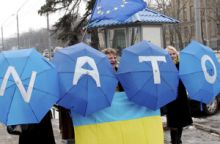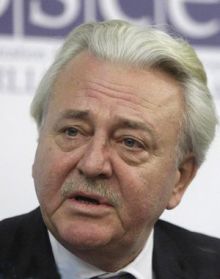A meeting of the Ukraine-NATO Inter-Parliamentary Council took place in Kyiv, at the Verkhovna Rada building on March 14. Assen Agov, Vice-President of the NATO Parliamentary Assembly, is NATO’s coordinator at this forum. It is not the first visit to Ukraine in this capacity. Agov talked about the role this institution is playing in the relations between Ukraine and the North Atlantic Treaty Organization, and presented his review of current relations between the Alliance and Kyiv, in an exclusive interview to The Day.
“THE NATO PARLIAMENTARY ASSEMBLY HELPS TO STRENGTHEN PARLIAMENTARY DEMOCRACY”
“The relations between the NATO Parliamentary Assembly and Ukraine were initiated immediately after Ukraine declared independence in 1991. Ukraine became an associated member and has taken an active part in the Assembly’s work ever since. During the NATO Assembly meetings Ukrainian MPs have a unique opportunity to meet the MPs of the NATO countries and their partner countries, and discuss the most urgent problems. Besides, now they are better informed of the key security problems, including NATO’s policy. In other words, NATO helps to strengthen parliamentary democracy in the whole European Atlantic region thanks to political cooperation and practical help given to the members of the Parliamentary Assembly.
In this way NATO expands and intensifies its partnership and cooperation program as well. When in 1997 the NATO-Ukraine Special Partnership Charter was signed, NATO appealed to the Parliamentary Assembly to expand the dialog with Ukrainian MPs. The Ukraine-NATO Inter-Parliamentary Council was created in response to this appeal. It is utterly important for MPs to have an opportunity to share their views. So when we discuss the Annual National Program (ANP) in Ukraine, we can address our national parliaments and inform their members of Ukraine’s achievements or flaws in its relations with NATO.”
Do you see that Ukrainian MPs comprehend the necessity of cooperation with the Alliance? How does this influence the activity of the Verkhovna Rada?
“The NATO Parliamentary Assembly maintains very active relations with the Verkhovna Rada. The Ukrainian delegation to the NATO Parliamentary Assembly consists of eight people, who represent all political forces of Verkhovna Rada (excluding communists): three representatives of the Party of Regions, three representatives of Yulia Tymoshenko Bloc, one representative of Our Ukraine, and another one that represents Lytvyn Bloc. Andrii Shkil, member of Yulia Tymoshenko Bloc, is the head of the delegation. It is obvious that the members of the Ukrainian delegation have different views on Ukraine’s membership in NATO, but considering our discussion within the Inter-Parliametrary Council, I feel that all of them realize the importance of cooperation with NATO and, of course, the importance of participating in the NATO Parliamentary Assembly. The mere fact that the Verkhovna Rada has its own delegation to the NATO Parliamentary Assembly, whose members take a most active part in our meetings, and the fact that each year Ukraine hosts the Inter-Parliametary Council meetings, is a proof that the members of the Verkhovna Rada understand and value the advantages of cooperation and Euro-Atlantic integration. Concerning the way it influences the work of Verkhovna Rada, as I have stated before, the participation in the NATO Parliamentary Assembly makes Ukrainian MPs better informed during discussions that relate to NATO. This may also help increase the quality of public discussion on NATO-related issues in Ukraine.”
“IT IS HARD TO EXPLAIN TO THE OFFICIALS THE MEANING OF THE ‘NON-ALIGNED STATUS’ POLICY”
Do the MPs realize that Ukraine has reached a deadlock after its non-aligned status was announced?
“This is the question to Ukrainian MPs directly, and probably, they will have different answers to it. I noticed that it is hard to explain to Ukrainian officials the meaning of the ‘non-aligned status’ policy and its practical consequences. For example, if the non-aligned status means neutrality, Ukraine has to be prepared to defend itself on its own. This simply has to have an influence on the military strategy of Ukraine and its defense budget. But again, this is a matter for Ukraine and its people to decide. Ukraine’s Alliance partners will respect the sovereign right of this country to choose its own priorities. It is a good thing that the non-aligned status influenced neither the intensity nor the quality of the cooperation, and the door to NATO remains open for Ukraine.”
Lately NATO has not been very popular in Ukraine. Nevertheless, Ukraine’s government continues the cooperation with the Alliance and keeps on executing the ANP. Could you give an evaluation of Ukraine’s ANP execution progress in 2011?
“Truth be told, the profoundness and scale of the cooperation between Ukraine and NATO are impressive, and even the ‘non-aligned status’ policy that was declared by Ukraine did not influence the intensity and quality of the cooperation. I see that this is of mutual benefit for Ukraine and NATO. The Annual National Program is an extensive document, in which Ukraine has set the goals and priorities in its relations with NATO. Ukrainian citizens have to understand one thing: it is not NATO that lays down conditions, but it is Ukraine that sets the goals, the achievement of which is going to aid the reform of political institutions, increase democratic control over defense and security, reform defense institutions and military forces in order to increase their efficiency, and ensure the possibility of keeping and improving the coordination with the military forces of other countries. It is true that there are a lot of mistaken conceptions about NATO in Ukraine, but it is important that people understand that the cooperation with NATO, just as the cooperation with the EU, aids the implementation of reforms in Ukraine.
“I want to make it clear that NATO itself gives an official estimation of the ANP progress, but we, members of the NATO Parliamentary Assembly, are regularly updated about it. Practically, this is the major goal of holding the Ukraine-NATO Inter-Parliamentary Council meeting in Kyiv on March 14. We are going to listen to briefings of the official representatives of Ukraine and NATO on the ANP execution in 2011 and the prospects for 2012. This is going to give the NATO MPs a unique opportunity to discuss the achievements and problems in the relations between Ukraine and NATO with the official representatives of NATO and Ukraine, and what is even more important, with their counterparts in the Verkhovna Rada.”
“THERE ARE A LOT OF EXAMPLES OF BENEFITS UKRAINE RECEIVES AS A RESULT OF COOPERATION WITH NATO”
How dynamic do you think is the development of the relations between Ukraine and NATO?
“As I have already said, the dynamics of the relations between Ukraine and NATO is quite intensive. This year we are going to celebrate the 15th anniversary of the NATO-Ukraine Special Partnership Charter signing that took place in 1997. The relations between NATO and Ukraine have been developing steadily since 1997. In 2002 the then president of Ukraine Leonid Kuchma submitted an official application on Ukraine’s ascension to NATO. During the period after the Orange Revolution Ukraine was vigorously moving towards NATO under the leadership of President Viktor Yushchenko. An intensified dialog on Ukraine’s desire to obtain NATO membership and the corresponding reforms was started in 2005. The members of the Alliance confirmed the prospect of Ukraine’s membership at the Bucharest Summit in April 2008, and this is a very important achievement. Today the door to NATO remains open and it is for the citizens of Ukraine to decide if they want to enter. The European Atlantic community respects the right of the Ukrainian nation to choose its own strategic goals.”
You said that there are a lot of false conceptions about NATO in Ukraine. Citizens of Ukraine would find it interesting to hear what advantages the cooperation of our country with the Alliance gives them.
“There are a lot of examples of benefits Ukraine receives as a result of cooperation with NATO. The Alliance helps Ukraine to implement public control over the armed forces, including parliamentary control and the participation of civic society in discussion on matters of defense and security, personnel training, modernization of the armed forces in order to strengthen their compatibility and ability to participate in international missions. NATO helps Ukraine watch over floods in the Prypiat River basin on the border between Ukraine and Belarus, an area where the Chornobyl Exclusion Zone is located as well. NATO and Ukraine discuss the ways to handle new security problems, including terrorism, spreading of weapons of mass destruction and the ways of their delivery, cyberdefense, and energy defense. NATO has a powerful project that helps Ukraine eliminate the excessive firearms. As you may know, Ukraine has a huge excess of firearms and light armaments, and tons of outdated ammunition that can put the safety of society under a threat in case of explosion or if they end up in wrong hands. And here is the last example: Ukraine and Poland are going to host the European Football Championship 2012 soon. NATO shares its knowledge and expertise in order to help both countries to make this large-scale international event as safe as possible.”









